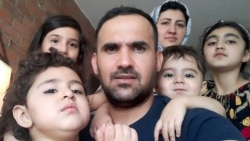When Isheh al-Masri stepped off a plane with her husband, Hussam Tahina, and four children to begin a new life in Canada, she was stunned to see a group of people clustered near the arrivals gate with welcome signs and placards bearing the names of her family members.
The greeting committee, including several high schoolers, belonged to a community group from the Atlantic coastal town of Wolfville, Nova Scotia, that would take primary responsibility for helping them become established in Canada with little involvement from the federal or local government.
"I had no idea. They didn’t tell us we have a sponsor group there,” said al-Masri, a Syrian refugee whose family had been waiting for five years in Jordan to be approved for permanent resettlement before coming to Canada in 2016.
The United Nations “told us we’re moving to Canada and that’s it. We had no idea," she told VOA in a recent interview.
"It's a reward in and of itself to see people greet you after a long journey and a difficult battle," she said. "My tiredness dissipated as a result of the kind greeting. Moving to a new nation is both exciting and terrifying. I had the impression that we are all humans living on the same planet, and that borders do not define us.”
The arrival of families like the Tahinas can be as exciting for their new hosts as for the refugees themselves.
'Powerful experience'
“Going to the Halifax Stanfield International Airport to greet a new refugee family arriving in Nova Scotia is a very powerful experience,” said Sheila Sears, who works with the charity Syria-Antigonish Families Embrace (SAFE).
“They are often the last passengers off the plane, so there is much anticipation in the arrivals area,” she told VOA. “Often fellow passengers and airport volunteers realize something special is happening and they wait with us.
“There are welcome signs in Arabic, flowers, excited family members, members of the Antigonish Syrian community and SAFE volunteers,” added Sears, a retired public health official and founding member of SAFE.
For the Tahinas, it has been five years since their fateful arrival at the Halifax airport. In that time, the family has become established in Nova Scotia: One son has graduated in computer science from Acadia University in Wolfville, another attended community college and the other two are still in college or high school.
Much of that was arranged with the help of the Wolfville Refugee Support Network that sponsored them and remains a vital source of strength.
“They still support us. Anytime we ask them for support, they support us,” said al-Masri, who uses her maiden name. “Financial things, social things, they encourage me to go back to school and study. They opened the door for us. They helped us to rebuild a new life here.”
Refugee sponsorship has also been an uplifting experience for the Wolfville network, which began with the Tahina family and now has sponsored 15 refugees. Four more are expected soon.
“We had huge community support,” said Judith Tod, a retired Baptist pastor and member of the network, who told VOA the organization began with a core group of about 10 people but has since attracted the interest of many fellow residents.
“And a lot of them became volunteers. We had a whole host of volunteers,” she said.
Canada’s Private Sponsorship of Refugees Program was launched in 1979, partly in response to the surge of refugees from Vietnam and Cambodia, and has been evolving since then. To date more than 300,000 refugees have relocated to Canada under the arrangement, which is seen as a model for a program being considered in the United States.
Pilot program
A State Department spokesperson confirmed to VOA this week that the department plans to launch a pilot private sponsorship program for refugees of any nationality beginning in 2022.
Axios has reported that the pilot program would allow private companies, advocacy groups and local communities to bring in and support refugees, including some of those Afghans paroled into the United States following the Taliban takeover in Kabul.
Under the Canadian program, any group of five or more citizens or permanent residents can sponsor an immigrant, though in many cases these are faith groups or community service organizations.
According to a government website, sponsorship groups can select from a list of candidates who have already been approved for refugee visas, or identify individuals of their own choosing who will then have to apply for refugee status.
During the first year, the sponsors are responsible for covering the refugees’ start-up costs — for furniture, clothing and monthly expenses such as housing, food and public transportation — and for supporting the refugees socially and emotionally. The government covers some other costs, such as health care, language classes and children’s education.
“About 58% of refugees admitted over the past 10 years have arrived under the Private Sponsorship of Refugees Program,” said Jona Zyfi, a doctoral student at the University of Toronto who is considered the top expert on Canada’s refugee sponsorship policy.
“One of the key benefits of refugee sponsorship is precisely providing a pathway for more individuals to seek safety and protection,” Zyfi explained. “It also permits citizens to respond to crises around the world, as it is a flexible tool. Indeed, the private sponsorship model in Canada arose out of a desire to do more.
“It is also a reflection of the positive outlook of Canadians towards immigration and resettlement, increases public support for refugees and provides citizens with a direct channel for action, assistance and participation. Thus, the model is attractive.”
Some problems
However, she added, the program has not been without its problems, including cultural barriers between refugees and their sponsors.
“Many sponsorship groups were unprepared for the scale of their responsibilities despite good intentions,” Zyfi said.
“In particular, while sponsorship groups ought to aim at securing the independence and autonomy of newcomers, they can sometimes behave in culturally inappropriate and paternalistic ways, which generate resentments between refugees and their sponsoring groups.”
Lee Cohen, the founder of the Halifax Refugee Clinic and a Halifax-based lawyer who specializes in refugee law, said the program has opened up another avenue for would-be refugees for whom the traditional path to permanent status in Canada — applying from within the country or at a border entry point — is too difficult.
“It is very difficult for most people from countries requiring a visa to Canada to get that visa, and declaring in a visa application that the applicant is seeking Canada’s protection is the fastest path to rejection,” he told VOA.
“On a practical level, it just makes sense to share the load and spread the responsibility and cost across the length and breadth of Canada,” he added. “If the task is too big for one government, it is made much more manageable when the entire country is permitted to become involved as sponsors.
“I have had it said to me by retired lawyers who I have involved in refugee cases that nothing they did in the entirety of their legal career equaled the satisfaction they felt assisting a refugee family. That is a sense of purpose and motivation that money cannot buy.”
Immigration reporter Aline Barros in Washington contributed to this report.






